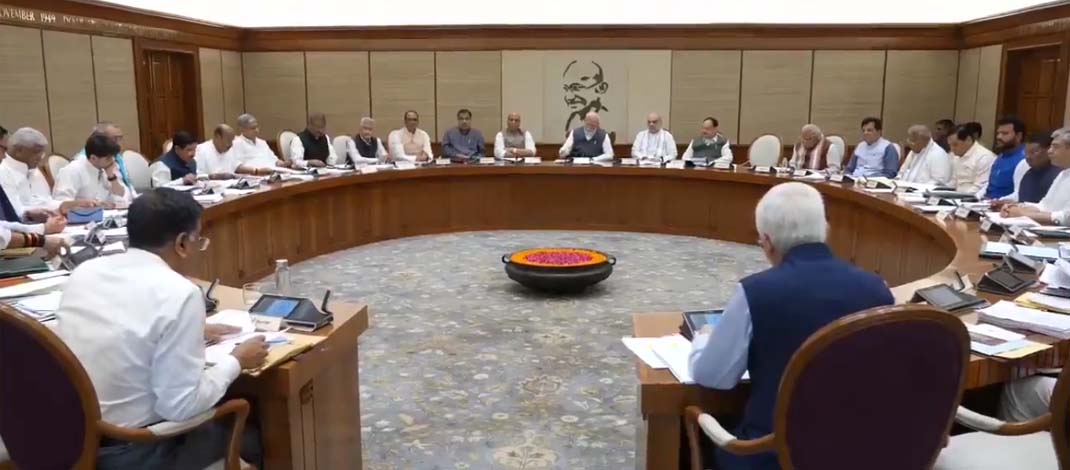- Courses
- GS Full Course 1 Year
- GS Full Course 2 Year
- GS Full Course 3 Year
- GS Full Course Till Selection
- Online Program
- GS Recorded Course
- NCERT (Recorded 500+ Hours)
- Polity Recorded Course
- Geography Recorded Course
- Economy Recorded Course
- AMAC Recorded Course
- Modern India, Post Independence & World History
- Environment Recoded Course
- Governance Recoded Course
- Science & Tech. Recoded Course
- International Relations and Internal Security Recorded Course
- Disaster Management Module Course
- Ethics Recoded Course
- Essay Recoded Course
- Current Affairs Recoded Course
- CSAT
- 5 LAYERED ARJUNA Mentorship
- Public Administration Optional
- ABOUT US
- OUR TOPPERS
- TEST SERIES
- FREE STUDY MATERIAL
- VIDEOS
- CONTACT US
4 UN Environmental Summits Fell Short in 2024: What Happened?
4 UN Environmental Summits Fell Short in 2024: What Happened?
03-01-2025

In 2024, four important UN environmental summits failed to produce strong agreements or meaningful outcomes, which are critical for addressing some of the world's most pressing environmental issues like biodiversity loss, climate change, land degradation, and plastic pollution.
-
Summits:
- In 2024, four key UN environmental summits failed to deliver meaningful outcomes:
- Biodiversity summit in Colombia.
- Climate summit in Azerbaijan.
- Land degradation summit in Saudi Arabia.
- Plastics pollution summit in South Korea.
- In 2024, four key UN environmental summits failed to deliver meaningful outcomes:
-
Goals of the Summits:
- These meetings aimed to:
- Align global goals.
- Build equitable accountability.
- Mobilize adequate finance for environmental action.
- Despite efforts, all four summits achieved either no or partial success.
- These meetings aimed to:
-
Recurrent Challenges:
- This marks the fourth time UN discussions on addressing biodiversity loss, climate change, and plastic pollution have faltered.
- Setbacks could lead to delayed action on issues like climate finance, drought mitigation, and plastic pollution.
Key Reasons for Summit Failures:
-
Divergent National Interests:
- Developing nations: Demanded more technology transfer and financial support for climate change adaptation and biodiversity conservation.
- Developed nations: Reluctant to commit additional resources, citing domestic political pressures and economic challenges.
- Example: In Colombia, talks on biodiversity conservation stalled over the lack of funding for sustainable land-use practices, with no agreement on the $700 billion annual requirement.
-
Financial Disagreements:
- Azerbaijan summit: Developing nations demanded $1.3 trillion/year for climate action, but developed nations only loosely agreed to raise funds from multiple sources, including private investment.
-
Fossil Fuel Divisions:
- In Azerbaijan, countries were divided over pledges made at the previous UN climate summit to transition away from fossil fuels.
-
Plastic Pollution Divide:
- The South Korea summit failed to agree on a legally binding treaty due to resistance from countries reliant on plastic industries, which favored improved recycling rather than binding reduction measures.
-
Crises Impact:
- Global crises such as the COVID-19 pandemic, economic instability, and geopolitical conflicts diverted attention and resources away from environmental goals.
- Countries, especially those with economic vulnerabilities, found it difficult to balance economic recovery with long-term environmental goals.
Consequences of Summit Failures:
-
Delayed Action:
- Failure to agree on frameworks and commitments delays necessary actions to address biodiversity loss, climate change, land degradation, and plastic pollution.
- This increases the risk of reaching irreversible tipping points in global systems.
-
Fragmented Efforts:
- Unilateral regional actions may rise, but they lack the global coherence necessary to address environmental issues comprehensively and equitably.
-
Erosion of Trust:
- Repeated failures in negotiations risk eroding trust among nations, making future cooperation even harder.
-
Pressure on Future Summits:
- The outcome of these failed summits adds pressure on future international meetings to deliver concrete and meaningful results.
Path Forward: Rebuilding Momentum
-
Climate Finance:
- Wealthier nations must honor commitments to provide financial and technological support to developing nations, creating an equitable foundation for negotiations.
- This would help bridge the trust gap between developed and developing countries.
-
Transparency & Accountability:
- Establish robust mechanisms to track progress and hold countries accountable for their commitments.
- Monitoring and accountability are crucial to restoring confidence in multilateral processes.
-
Inclusive Diplomacy:
- Ensure equitable participation of vulnerable nations in negotiations, addressing geopolitical tensions.
- A more inclusive approach will foster effective global cooperation.
-
Focus on Implementation:
- Shift emphasis from ambitious pledges to tangible actions backed by measurable outcomes.
- This ensures progress even amid broader disagreements.
-
Addressing Interconnections Between Environmental Crises:
- Recognize and address the interconnectedness of biodiversity loss, land degradation, plastic pollution, and climate change.
- Tackling these issues in isolation has proven insufficient, and integrated strategies are needed to protect ecosystems, restore degraded lands, and reduce pollution.
-
Global Cooperation:
- Acknowledge that global environmental challenges require a shared vision for a sustainable future.
- Countries must move beyond short-term interests to achieve long-term environmental sustainability.
Conclusion: The failures of the 2024 UN environmental summits highlight the growing divide in global priorities and the significant barriers to collective action. While the challenges are immense, so are the stakes. To prevent further setbacks, global cooperation, financial commitments, and pragmatic, integrated strategies are critical for addressing urgent environmental crises.
|
Also Read |
|


